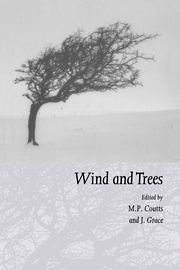Book contents
- Frontmatter
- Contents
- Preface
- List of contributors
- Part I Airflow over topography and in forests
- Part II Mechanics of trees under wind loading
- Part III Tree physiological responses
- Part IV Impacts of wind on forests and ecology
- 18 Hurricane disturbance regimes in temperate and tropical forest ecosystems
- 19 A comparison of methods for quantifying catastrophic wind damage to forests
- 20 Windthrow and airflow in a subalpine forest
- Part V Risk assessment and management response
- Index
18 - Hurricane disturbance regimes in temperate and tropical forest ecosystems
Published online by Cambridge University Press: 27 October 2009
- Frontmatter
- Contents
- Preface
- List of contributors
- Part I Airflow over topography and in forests
- Part II Mechanics of trees under wind loading
- Part III Tree physiological responses
- Part IV Impacts of wind on forests and ecology
- 18 Hurricane disturbance regimes in temperate and tropical forest ecosystems
- 19 A comparison of methods for quantifying catastrophic wind damage to forests
- 20 Windthrow and airflow in a subalpine forest
- Part V Risk assessment and management response
- Index
Summary
Abstract
We provide an overview of hurricane disturbance regimes in the north-eastern United States and the Caribbean, with a focus on ecological effects on temperate and tropical forests. Hurricanes in tropical regions occur with a higher frequency and reach higher intensity levels than in temperate regions. Slower movement of hurricanes in the tropics exposes forests to longer periods of damaging winds from a broader range of wind directions. At the regional to landscape level we are applying models of hurricane meteorology and topographic exposure to reconstruct wind conditions during historically important storms in order to compare these results with observations of forest damage, and to test two hypotheses: (1) regional gradients of hurricane frequency and intensity result from prevailing hurricane tracks and the configuration of coastlines and mountain ranges and (2) landscape gradients in wind exposure result from the interaction of peak wind directions and local topography. At the community level damage is controlled by windspeed, vegetation structure and composition, and site conditions. Damage patterns strongly control subsequent vegetation dynamics: (1) differential species damage determines the initial composition and structure of the vegetation, (2) leaf area establishment is controlled by damage type and forest composition, and (3) microenvironmental conditions and resource distribution are determined by the spatial pattern of residual vegetation. Field studies underline the offentimes low rate of initial mortality following catastrophic storms and the importance of releafing and sprouting in vegetation development. Changes in key ecosystem processes are often slight following even major hurricanes. Studies in Puerto Rico and New England document that nutrient retention was high, nutrient losses were minimal, soil moisture changed little, and minor changes in trace gas fluxes returned rapidly to pre-disturbance levels.
- Type
- Chapter
- Information
- Wind and Trees , pp. 305 - 339Publisher: Cambridge University PressPrint publication year: 1995
- 20
- Cited by

